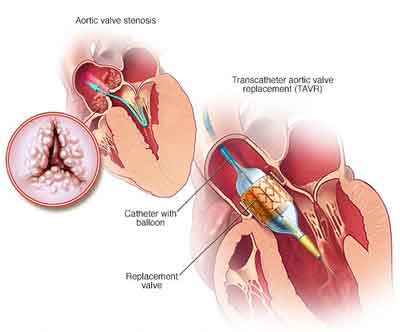- Home
- Editorial
- News
- Practice Guidelines
- Anesthesiology Guidelines
- Cancer Guidelines
- Cardiac Sciences Guidelines
- Critical Care Guidelines
- Dentistry Guidelines
- Dermatology Guidelines
- Diabetes and Endo Guidelines
- Diagnostics Guidelines
- ENT Guidelines
- Featured Practice Guidelines
- Gastroenterology Guidelines
- Geriatrics Guidelines
- Medicine Guidelines
- Nephrology Guidelines
- Neurosciences Guidelines
- Obs and Gynae Guidelines
- Ophthalmology Guidelines
- Orthopaedics Guidelines
- Paediatrics Guidelines
- Psychiatry Guidelines
- Pulmonology Guidelines
- Radiology Guidelines
- Surgery Guidelines
- Urology Guidelines
New TAVR System Safe and Effective for High-Risk Surgical Patients with Severe Aortic Stenosis

SAN FRANCISCO – The Portico IDE study found that 30-day safety and one-year effectiveness outcomes of a novel self-expanding transcatheter aortic valve replacement (TAVR) system for patients with severe aortic stenosis (AS) at high or extreme-risk for surgery was noninferior to contemporary FDA-approved TAVR systems available in the United States.
Findings were reported today at the 31st annual Transcatheter Cardiovascular Therapeutics (TCT) scientific symposium. Sponsored by the Cardiovascular Research Foundation (CRF), TCT is the world’s premier educational meeting specializing in interventional cardiovascular medicine.
PORTICO was a prospective, multi-center, controlled, open-label, non-inferiority intention-to-treat evaluation of the safety and effectiveness of the Portico TAVR system compared with FDA-approved and commercially available TAVR systems. Between May 2014 and June 2019, 750 patients from 69 sites were randomized 1:1 to each group. For the randomized cohort, baseline characteristics were balanced for both groups; the mean age was 83.3 years (±7.3 years), 52.7% were female, and the mean STS score was 6.5%. Procedural success was comparable between groups (96.5% for Portico versus 98.3% for commercially available TAVR).
The study met both the pre-specified primary safety composite endpoint (all-cause mortality, disabling stroke, life-threatening bleeding requiring blood transfusion, acute kidney injury requiring dialysis, or major vascular complications at 30 days, 13.8% vs 9.6%; pnon-inferiority=0.03) and the primary effectiveness composite endpoint (all-cause mortality or disabling stroke at one-year, 14.9% vs 13.4%, pnon-inferiority =0.006).
The study also included a separate 100 patient cohort who underwent Portico valve implantation using the FlexNav Delivery System. The primary safety endpoint for the FlexNav cohort was major vascular complication rate at 30 days. This cohort demonstrated no deaths or strokes, low rates of major vascular complications (7.0%) and new permanent pacemaker implants (14.6%) as well as a safety profile comparable with the commercially available valve group in the randomized study (8.0% vs 9.6%).
“Transcatheter aortic valve replacement has fundamentally changed how we approach patient care. Findings from the Portico IDE study have added important new data to the body of TAVR clinical evidence,” said Greg Fontana, MD, principal investigator. Dr. Fontana is Director and Chairman, Cardiothoracic Surgery, CardioVascular Institute of Los Robles Regional Medical Center. “By demonstrating results in line with contemporary TAVR systems and an improved delivery system, the Portico valve with FlexNav delivery system has demonstrated IDE clinical results on par with commercially available valves.”
The PORTICO study was funded by Abbott. Dr. Fontana disclosed grant/research support from Abbott and Medtronic and consulting fees/honoraria from Abbott, Medtronic, and LivaNova.
About CRF and TCT
The Cardiovascular Research Foundation (CRF) is one of the world’s leading nonprofit organizations specializing in interventional cardiology innovation, research, and education. CRF is dedicated to helping doctors improve survival and quality of life for people suffering from heart and vascular disease. For nearly 30 years, CRF has helped pioneer medical advances and educated doctors on the latest treatments for heart disease. CRF is comprised of the CRF Skirball Center for Innovation, CRF Clinical Trials Center, CRF Center for Education, CRF Digital, TCTMD, and Structural Heart: The Journal of the Heart Team.
Transcatheter Cardiovascular Therapeutics (TCT) is the annual scientific symposium of CRF and the premier educational meeting specializing in interventional cardiovascular medicine. Now in its 31st year, TCT features major medical research breakthroughs and gathers leading researchers and clinicians from around the world to present and discuss the latest evidence-based research in the field. TCT also includes interactive training pavilions where clinicians can gain vital skills to apply immediately to their practices.

Disclaimer: This site is primarily intended for healthcare professionals. Any content/information on this website does not replace the advice of medical and/or health professionals and should not be construed as medical/diagnostic advice/endorsement or prescription. Use of this site is subject to our terms of use, privacy policy, advertisement policy. © 2020 Minerva Medical Treatment Pvt Ltd